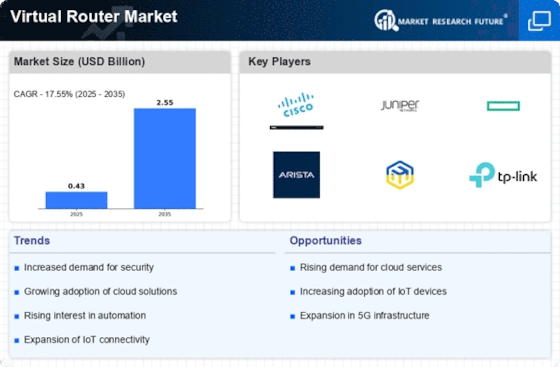Market Share
Introduction: Navigating the Competitive Landscape of the Virtual Router Market
Competition is growing in the virtual router market, and is being reshaped by the speed of technological adoption, changes in the regulatory framework and the growing expectations of consumers for seamless connections. Competition for leadership is intense, with OEMs, systems integrators and network operators deploying advanced capabilities such as machine learning and automation to enhance performance and the customer experience. Challengers, especially agile start-ups, are also deploying new solutions to disrupt established business models, with a focus on the Internet of Things and green IT to meet the needs of the circular economy. In the face of growing regional opportunities, especially in Asia-Pacific and North America, strategic deployments are increasingly focused on cloud-native architectures and edge computing solutions. This dynamic market requires C-level decision-makers and strategic planners to keep their eyes on the technological developments that will define the winners in the coming years.
Competitive Positioning
Full-Suite Integrators
These vendors offer comprehensive solutions that integrate various networking functionalities, catering to large enterprises and service providers.
| Vendor | Competitive Edge | Solution Focus | Regional Focus |
|---|---|---|---|
| IBM Corporation | Strong enterprise integration capabilities | Cloud and networking solutions | Global |
| Cisco Systems | Market leader with extensive portfolio | Networking hardware and software | Global |
| Hewlett Packard Enterprise Company | Innovative hybrid IT solutions | Networking and IT infrastructure | Global |
Specialized Technology Vendors
These vendors focus on niche technologies and solutions, providing advanced features tailored to specific networking needs.
| Vendor | Competitive Edge | Solution Focus | Regional Focus |
|---|---|---|---|
| Juniper Networks Inc. | High-performance networking solutions | Routing and security | Global |
| netElastic Systems Inc. | Innovative virtual routing technology | Virtual routers and SDN | North America |
| Arista Networks Inc. | Cloud networking expertise | Data center and cloud networking | Global |
Infrastructure & Equipment Providers
These vendors provide essential hardware and infrastructure solutions that support virtual routing capabilities.
| Vendor | Competitive Edge | Solution Focus | Regional Focus |
|---|---|---|---|
| Ericsson Inc. | Strong telecom infrastructure focus | Telecom and networking equipment | Global |
| Huawei Technologies Co.Ltd. | Extensive R&D and innovation | Telecom and networking solutions | Global |
| Nokia Corporation | End-to-end networking solutions | Telecom infrastructure and services | Global |
| Brocade Communications Systems | Expertise in storage networking | Networking and storage solutions | North America |
Emerging Players & Regional Champions
- CloudRouter (USA): Cloud-native routing solutions, with a focus on scalability and security, recently teamed up with a large telecommunications provider to provide cloud services. CloudRouter is challenging the incumbents with its more flexible and cost-effective solutions.
- NetVirtue (Germany): Specializes in virtual routing for IoT applications, recently implemented a solution for a smart city project, complementing traditional vendors by targeting niche markets with specific needs.
- VRouterTech (India): Provides affordable virtual routing solutions for small to medium enterprises, recently secured contracts with several local ISPs, challenging larger vendors by offering tailored solutions at competitive prices.
- RouterX (Brazil): Focuses on virtual routing for edge computing, recently launched a partnership with a regional data center to optimize their network, complementing established vendors by enhancing edge capabilities.
Regional Trends: In 2023, virtual routers are likely to experience a marked uptake in emerging markets, particularly in Asia and South America, where cloud services and IoT applications are on the rise. Companies are specializing in the provision of specialized solutions, for example in the fields of smart cities and edge computing, which the major operators are not yet fully addressing.
Collaborations & M&A Movements
- Cisco and VMware announced a partnership to integrate their virtual router technologies, aiming to enhance cloud networking solutions and improve competitive positioning in the enterprise market.
- Juniper Networks acquired Mist Systems to bolster its AI-driven virtual routing capabilities, positioning itself as a leader in the intelligent networking space.
- Arista Networks and Amazon Web Services (AWS) entered into a collaboration to develop advanced virtual routing solutions for cloud-native applications, enhancing their market share in the cloud infrastructure sector.
Competitive Summary Table
| Capability | Leading Players | Remarks |
|---|---|---|
| High Availability | Cisco, Juniper Networks | Cisco's Virtual Router technology offers robust failover capabilities, ensuring minimal downtime. Juniper's solution is known for its seamless integration with existing infrastructure, enhancing reliability. |
| Scalability | Arista Networks, MikroTik | Arista's virtual routers are designed for cloud-scale environments, allowing for rapid scaling without performance degradation. MikroTik provides cost-effective solutions that can easily scale for small to medium enterprises. |
| Security Features | Palo Alto Networks, Fortinet | Palo Alto's virtual routers incorporate advanced threat prevention and secure SD-WAN capabilities. Fortinet's solutions are recognized for their integrated security features, providing comprehensive protection against cyber threats. |
| Multi-Cloud Support | VMware, Amazon Web Services (AWS) | VMware's virtual routers facilitate seamless connectivity across multiple cloud environments, enhancing flexibility. AWS offers native support for its virtual routers, allowing for easy integration with its cloud services. |
| Performance Optimization | Nokia, Huawei | Nokia's virtual routers utilize AI-driven analytics to optimize performance in real-time. Huawei's solutions are known for their high throughput and low latency, making them suitable for demanding applications. |
Conclusion: Navigating the Virtual Router Landscape
The Virtual Routers Market in 2023 is characterized by a fragmented market, with both the traditional and the new players vying for dominance. The major players are deploying advanced technology such as AI and automation to improve the delivery of services and operational efficiency. The new entrants are focusing on the concept of sustainability and the need for flexibility to appeal to the market's increasing concern for the environment and the need for flexibility. The growing demand for localized services has prompted vendors to offer localized solutions to meet the local market needs. The ability to take advantage of AI and automation and the concept of sustainable development will be the deciding factor for market leaders in the future. Strategic considerations of these factors must be made to effectively manage the complexity of the dynamic market.

















Leave a Comment